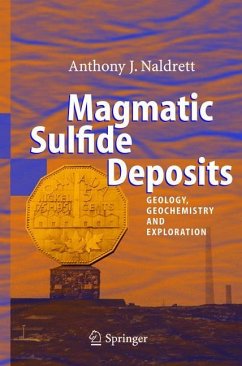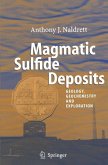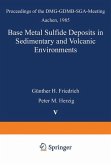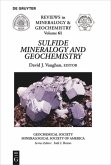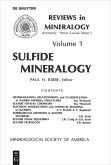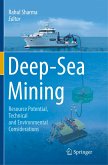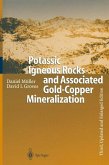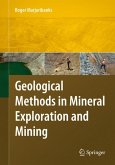This book is written by a leading authority on the subject of magmatic sulfide deposits. An overview of deposit types, accompanied by a summary of the resources of nickel, copper and platinum-group elements in the world’s principal known deposits, is followed by a summary of the relevant physical chemistry. The core of the book comprises a discussion about the geology and geochemistry of each of the deposit types in turn, accompanied by the implications of this data to the origin of the deposits in the light of our understanding of the chemical processes involved. A final chapter focuses on the use of the genetic concepts in exploration.
PGE V-Voisey's Bay (Canada) D -Duluth Complex (USA) K-Kambalda (Australia) M-Merensky Reef (Bushveld) N -Noril'sk region (Russia) P-Pechenga(Russia) S-Sudbury (Canada) T-Thompson (Canada) J -Jinchuan (China) L-Lac des lies (Canada) PR-Platreef (Bushveld) Po-Portimo Complex (Finland) R-Raglan (Canada) U-UG-2 chromitite (Bushveld) Z-Great Dyke of Zimbabwe e-Mt Keith (Australia) . ä. -Perseverance (Australia) +-Stillwater (USA) 0 0 0 'c9 -~ Ni+Co Cu Relative value of Ni+Co Fig. 1. 1. Relative va1ue of the contributions of Ni+Co, Cu and PGE to the mag matic su1fide deposits listed in Table 1. 1 sulfide deposits are closely related to bodies of mafic or ultramafic rock, and the most convenient way in which to consider them is in terms of the type of magma responsible for the rocks with which they are associated. Typically the type of magma involved bears a close relationship to the tec tonic setting within which it was emplaced. The locations of important deposits, both Ni-Cu dominantand PGE dominant, are shown in Fig. 1. 2. Considering first Ni-Cu deposits, these are further divided into six classes (Table 1. 2) on the basis of their associated magma type. Class NC- 1 (Chap. 3) comprises those related to komatiitic magmatism. Currently known deposits fall into two sub-classes, those related to Archean komatiites ( e. g. the deposits of Western Australia, Zimbabwe and the Abitibi belt of Canada) and those related to Proterozoic komatiites (e. g. those ofthe Raglau and Thompson belts which arebothin Canada)l.
Hinweis: Dieser Artikel kann nur an eine deutsche Lieferadresse ausgeliefert werden.
PGE V-Voisey's Bay (Canada) D -Duluth Complex (USA) K-Kambalda (Australia) M-Merensky Reef (Bushveld) N -Noril'sk region (Russia) P-Pechenga(Russia) S-Sudbury (Canada) T-Thompson (Canada) J -Jinchuan (China) L-Lac des lies (Canada) PR-Platreef (Bushveld) Po-Portimo Complex (Finland) R-Raglan (Canada) U-UG-2 chromitite (Bushveld) Z-Great Dyke of Zimbabwe e-Mt Keith (Australia) . ä. -Perseverance (Australia) +-Stillwater (USA) 0 0 0 'c9 -~ Ni+Co Cu Relative value of Ni+Co Fig. 1. 1. Relative va1ue of the contributions of Ni+Co, Cu and PGE to the mag matic su1fide deposits listed in Table 1. 1 sulfide deposits are closely related to bodies of mafic or ultramafic rock, and the most convenient way in which to consider them is in terms of the type of magma responsible for the rocks with which they are associated. Typically the type of magma involved bears a close relationship to the tec tonic setting within which it was emplaced. The locations of important deposits, both Ni-Cu dominantand PGE dominant, are shown in Fig. 1. 2. Considering first Ni-Cu deposits, these are further divided into six classes (Table 1. 2) on the basis of their associated magma type. Class NC- 1 (Chap. 3) comprises those related to komatiitic magmatism. Currently known deposits fall into two sub-classes, those related to Archean komatiites ( e. g. the deposits of Western Australia, Zimbabwe and the Abitibi belt of Canada) and those related to Proterozoic komatiites (e. g. those ofthe Raglau and Thompson belts which arebothin Canada)l.
Hinweis: Dieser Artikel kann nur an eine deutsche Lieferadresse ausgeliefert werden.
From the reviews: "This book ... provides a welcome personalized overview of the current ideas on the origin of Ni-Cu sulfide deposits ... . Very importantly, the book shows clearly how the study of ore-forming processes helps in mineral exploration. ... I would advise all my graduate students to tackle this remarkable piece of work. Overall, Magmatic sulfide deposits ... is strongly recommended to professional economic geologists and any scientifically literate person who wants an introduction to the subject." (Mei-Fu Zhou, Economic Geology, 2005) "It clearly represents a comprehensive summary of the life's work of an acknowledged expert in the field of magmatic sulphide deposits through out the world. ... This is a comprehensive and detailed treatise, clearly written and well illustrated with a large number of maps and diagrams. ... The excellent writing style will make this book accessible to all, from students looking for specific references to those who seek a comprehensive knowledge ... . Researchers and industrial professionals will find this volume indispensable ... ." (Dr. Stephen Cribb, Materials World, June, 2006) "Magmatic Sulphide Deposits provides an updated summary of the state of understanding of the most important Ni sulfide deposits. This book is an enormously expanded and updated version of his original textbook on the subject ... . provides a wealth of information to the reader in a form that is readily understood by one who is new to the subject." (Peter C. Lightfoot, The Canadian Mineralogist, Vol. 43, 2005)

